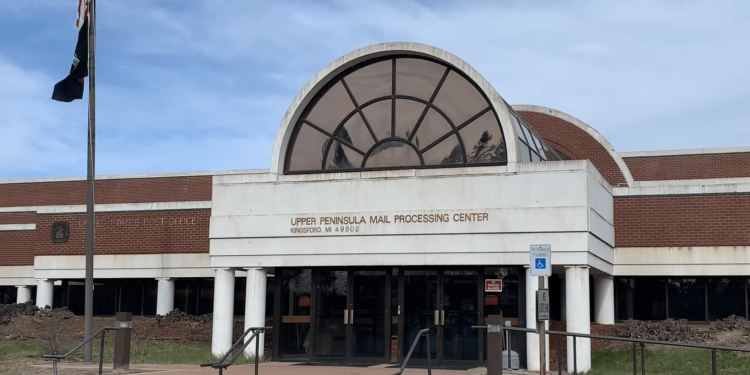IRON MOUNTAIN, Mich. (WZMQ) – In a recent Homeland Security Committee hearing, Senator Gary Peters voiced concerns over potential changes to mail operations in the Upper Peninsula, urging caution and transparency from the Postal Board of Governors. Peters emphasized the need for clear data on the long-term impacts before proceeding with any alterations.
During the hearing, Peters stated, “There is no clear evidence that shows these changes will improve service in the long run.” He highlighted the lack of detailed studies provided by the Postal Service, and called for collaboration to ensure transparency.
In response, the Chairman of the Postal Board, Roman Martinez IV, highlighted the immense challenge of restructuring while maintaining service, citing the agency’s daily handling of over 400 million pieces of mail.
“I can say that the board agrees 100% with the objectives that you’ve laid out, which are consistent with what the Postmaster General’s objectives are. I just want to point out to keep in mind. This huge restructuring is happening at the same time that we’ve got to deliver service. It’s not as if we’re doing it from scratch, so it’s difficult stuff, and this statistic that always floors people: we handle daily almost 400 million pieces of mail and packages,” stated the Chairman.
Following the hearing, Senator Peters held a press conference, expressing dissatisfaction with the Postal Service’s handling of community concerns, particularly in Iron Mountain.
Peters emphasized the need for data-backed decision-making, citing declines in on-time delivery in out-of-state cities like Atlanta and Richmond. He stressed the critical importance of timely mail delivery, especially for services like water testing and medication delivery for veterans in rural areas.
“I’m a data-driven person, and the Postal Service believes that they have a good plan, but we don’t know it’s a good plan until the data actually demonstrates that. Clearly, the data in Richmond and Atlanta are not demonstrating that [it’s] a plan that delivers on-time performance while reducing cost. It’s actually increasing cost, and reducing on-time performance,” stated Peters.
Echoing Peters’ concerns in a statement, Congressman Bergman – who attended the public input hearing for the review of the Upper Peninsula’s mail processing center – criticized the lack of factual accuracy in the Postal Service’s community meeting held on April 1st. He pledged to continue pressing for accountability, and the right course of action.
“They didn’t have their facts right, they hadn’t done their homework, and that was greatly disappointing. So we are going to keep up, through my office and whoever else will be affected by this. We’re going to keep pushing the Postal Service to do the right thing for the right reasons. Because this is the wrong thing,” stated Bergman.
Senator Peters called on Postmaster General DeJoy to halt the changes and provide necessary information by May 1st. He emphasized the need for the Postal Regulatory Commission to assess the situation and offer recommendations for corrective actions.
“I asked the postmaster general Dejoy for a list of documents and studies that I would like to see, including those studies related to the Upper Peninsula. I asked him to deliver those by May 1. He tells me he will get back, but we are going to hold him to that hard deadline. Transparency is important. What the Postal Service needs right now is to build trust,” informed Peters.
Peters underscored the importance of transparency and accountability, urging the Postal Service to engage in real public comment before implementing changes.
“But I’m going to really withhold judgment until they see exactly what they’re asking that advisory to contain, the scope of that advisory, and their willingness to take whatever advice comes out of that advisory to heart,” he vowed.
Senator Peters highlighted legislation passed last year aimed at aligning Postal Service requirements with private industry standards, leading to significant cost savings.
Peters shared, “Part of it, we tried to align requirements on the Postal Service with private industry, particularly when it came to pensions and healthcare. Healthcare, for example, to be able to align retiree healthcare with Medicare – to coordinate with Medicare like every other company in America, they were required to fully fund healthcare for a decade in advance, which is something that no company in America is required, so the legislation ensured that the Postal Service operates under the same kind of requirements that private companies are expected to comply with. That change in law was to the Postal Service roughly $50 billion over the years, which helps keep them on a much sounder financial footing.”
In his closing hearing remarks, Peters reaffirmed his commitment to ensuring the Postal Service remains strong and efficient for all Americans. He emphasized the need for continued collaboration within the committee, and transparency to address the concerns facing the U.P. and other communities across the country.


















